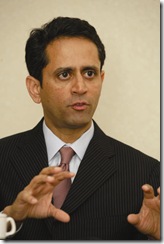A year ago Comm. conducted a detailed interview with Vinod Kumar, the chief operating officer of the communications arm of the Indian conglomerate Tata Group. Kumar spoke of Tata Communications’ ambition to become known as an emerging market communications specialist, and one year on, at an event hosted in London, he and Tata Communications CEO, Srinath Narasimhan detailed how much closer the company is to achieving this vision
Srinath Narasimhan says Tata Communications is looking to build at least one new home market in addition to India and South Africa in the coming two-three years
Tata Communications is a company that has developed through a combination of organic and inorganic growth, and true to this pedigree continues to look for opportunities both in terms of synergies and geographies as it simultaneously carves out its own strategy.
Having only introduced the Tata Communications banner in 2008, it has quickly grown in recognition across continents, leap-frogging from India to the Middle East, Africa and Europe, and incorporating diverse communications operations ranging from international voice wholesaling to submarine cables, Internet backbones and data centres.
The business that exists is already a formidable one. Tata Communications is the world’s largest wholesale international voice carrier, the largest submarine cable operator, and offers one of the largest global Internet backbones
The company employs approximately 6,400 staff, operates 40 data centres (which combined house 10,000 racks), and carries 32 billion minutes of international traffic a year, which represents a 30 per cent increase from a year ago.
In its fiscal year 2010 to end-March 2010, Tata Communications produced double-digit growth for its data services (10 per cent), nine per cent for its other activities and five per cent for its voice services, all-said a sturdy performance given the state of the global economy in 2009 and the large price cuts and customer discounts the company offered.
India continues to be the bedrock of Tata Communications operations, though its growing footprint of investments across the globe and in emerging markets in particular, is testament to the company’s efforts to diversify the geography of its operations substantially.
In South Africa for instance, Tata Communications holds a 56 per cent stake in Neotel, the country’s second national operator that offers complete services other than mobile.
“The voice business accounts for about 60 per cent of Tata Communications’ revenues,” explained CEO Srinath Narasimhan. “The cash being generated from voice is being ploughed into the enterprise segment of the business.”
Narasimhan believes the broadband opportunity in India to be huge, with Tata Communications operating a WiMAX network aimed at the enterprise market, but which still remains a relatively small play when compared to global opportunities that the company has set its eyes on.
“At the core of what we do well is wholesale,” commented Narasimhan. “The sub-marine cables being laid are being assisted by the wholesale business,” he added, making the point that Tata Communications strength remains in India with interest in connectivity to the country being a reason the company has been able to leverage its domestic relationships in other markets.
In the past four years Tata Communications has invested over US$2 billion in building infrastructure and new service capabilities as well as entering new markets. Markets such as South Africa, China, Nepal and Sri Lanka continued to be viewed as significant opportunities and engines for growth for the company.
Managed services is another area identified as a growth opportunity and with 19 per cent of Tata Communications employees based outside of India, being close to customers irrespective of their geography is gaining traction.
Vinod Kumar, Tata Communications’ chief operating officer views the company’s current strategy as being defined by its focus on emerging markets; the convergence of voice and data; and the uptake of managed services.
“There is a real demand for solutions that help service operators to overcome current challenges,” said Kumar. “Service operators are seeking managed services given investment in Next Generation Network architecture and the growth in pay-as-you-go infrastructure models.”
Thus Kumar is of the opinion that managed solutions offer a ‘new world’ promise to enterprises and service providers alike.
Kumar is confident that the company is investing in the right areas and believes the global economic downturn has in fact reinforced Tata Communications’ investment strategy
Kumar believes strongly in flexible commercial models including public telepresence and MPLS one-price strategy across global markets. For instance the company aims to add another 25 public telepresence rooms this year. The new rooms will bring the total number of public telepresence venues operated by Tata to 38 by year-end.
As part of its global partnership with Starwood Hotels & Resorts, Tata Communications recently launched two new telepresence rooms at the W Chicago City Centre Hotel in the US, and the Sheraton on the Park in Sydney, Australia, bringing rooms connected to its network to 13 as of March 2010.
Tata Communications operates rooms in Boston, Chicago, Manila, Sydney, Bangalore (two), Chennai, Gurgaon, Hyderabad, Mumbai, London and Johannesburg.
Six additional locations are targeted to be added in the Middle East and Africa by the end of 2010 while new sites are also planned for cities across the US, Europe and Asia.
Emerging markets, however, remain at the core of the company’s direction and in the Middle East region, for example, Kumar said the company is working with many operators in the region given the fact that deregulation is taking place and the company is in a position to assist operators establish MPLS or hosting services.
Tata Communications’ Tata Global Network (TGN) is a prime example of the type of impact the Indian communications company is having in the region. The project incorporates Bahrain Internet Exchange, Nawras in Oman, Qtel, Mobily in Saudi Arabia, and Etisalat; with each carrier being an exclusive landing party for the TGN Gulf Cable System. The basis of the strategic relationship is to support the development of an extended portfolio of advanced telecom services such as global Ethernet, MPLS-based VPN, managed security, infrastructure as a service, and global telepresence.
Over the past four years Tata Communications has invested significantly in building infrastructure and new service capabilities as well as entering new markets. In 2008 the company announced an investment of US$2 billion over its FY09-FY11, and during the first two years of the three-year period it has already invested nearly US$1.2 billion.
“We are investing in creating capabilities,” said Kumar. “We are confident in the areas that are being invested in as being relevant, and in many ways our company’s focus has been reinforced by the global economic downturn.”
Narasimhan says his management team have taken a long-term view to build on the investments that have been made. Tata Communications started off in voice, moved into data and is now pushing services.
“We have been rebuilding a business model from scratch over the past five years,” said Narasimhan.
Kumar’s vision of Tata Communications’ strategy
• To continue to lead in India
• Opportunities from cloud and virtualisation
• Infrastructure to create differentiated offerings
• Anticipatory and personalised customer experience
• Build on integrated wholesale for enterprise
• Embody Tata values of trust and integrity
Tata Communications’ stated strategic focus
• Redefining ‘wholesale from a commodity, low value business to a partnership-driven, value-enhancing one
• Expanding access networks in India including rolling out wireless (WiMAX) networks for business and consumers
• Rapidly grow its global enterprise segment with catalyst services including telepresence, media and entertainment solutions, Ethernet and cloud computing
• Achieving global benchmarks in customer services and operations
• Creating at least one new ‘home market’ in addition to India and South Africa






2 comments ↓
Wow! This is incredible that an Indian company is leading communications in the World! Kudos to the Tata Group and its visionary leaders who know how to convert the opportunities in to viable businesses.
Telecom is a highly competitive and capital intensive area and it’s incredible to see Tata’s footprint around the globe in voice, data, and other services.
Three cheers to the Tata brand!
Amazing strategy. I’m proud to be a Tata employee.
Leave a Comment